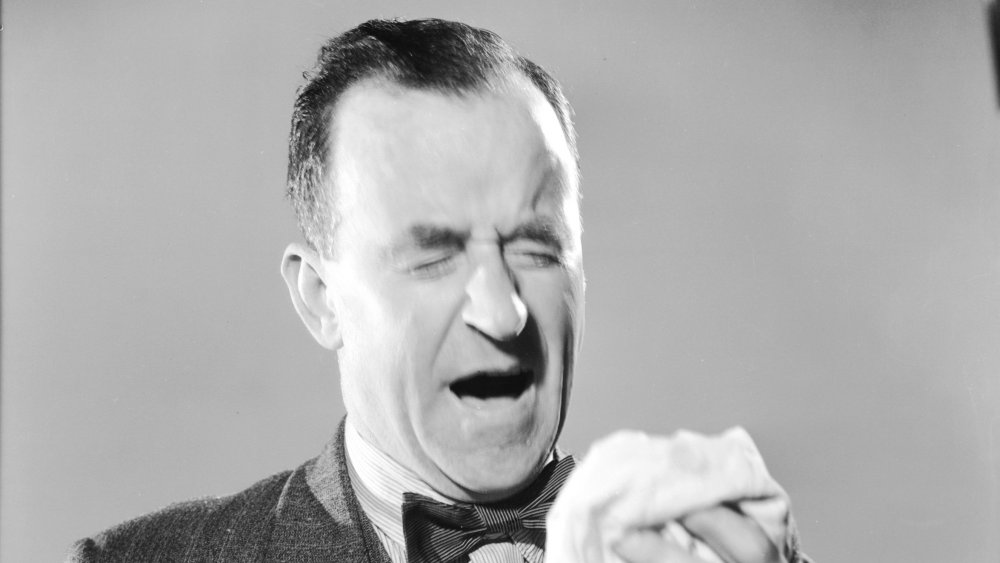The Real Reason Bright Lights Make Some People Sneeze
The more that science looks into our weird little quirks that make others giggle, the more we find that our genetics are to blame. Case in point: have you ever had a sneeze attack as soon as you walk out into the sun? Or do bright lights help you sneeze when you get a tickle in your nose? Luckily, you're not as weird as your friends think you are as you stumble around in search of a bright light to help you say "achoo!" This strange trait is actually a genetic condition known as photic sneeze reflex, and you're not making it up. It's a real affliction you can add to the list of things you blame on your parents. The condition is also known as autosomal dominant compelling helio-ophthalmic outburst, which, if you ignore the D from the word "dominant," gives you the contrived doctor joke of an acronym: ACHOO syndrome. (Bless you.)
According to Healthline, photic reflex sneezes are distinct from the regular ones which are provoked by allergies, infections, or irritants. Anywhere from 11-35 percent of the population is troubled with photic sneeze reflex, but a 1995 study published in the Journal of the American Optometric Association and posted to Pub Med revealed that the vast majority of ACHOO syndrome sufferers are white females.
The science behind sneezing under bright lights
The reflex to sneeze under a bright light isn't necessarily caused by the light itself. The cause is the change in light intensity, so ACHOO syndrome sufferers will have a sneeze attack upon leaving the house on a sunny day, for example, or driving out of a dark tunnel into the sunlight. Photic sneeze attacks can range from one resounding explosion to a series of two or three. According to a study in the OMIM genetic database, some poor, dazzled souls have been observed to let out a rash of as many as 43 sneezes.
What is known as "pure" photic sneezing, or a sneeze completely triggered by a change in light intensity, is much less common than bright lights being a catalyst for a stubborn sneeze that didn't want to come out, according to data compiled by the National Center for Biotechnology Information. Since so many stimuli can cause you to sneeze, from pepper to fall allergies to a tug on a stray nose hair, you might suffer from photic sneeze reflex and not even know it. But it's not like you can just take a test and see if you've got ACHOO syndrome. It is diagnosed by a review of your clinical history. The syndrome is a dominant trait, so if one of your parents can't help but sneeze under bright lights, you've got a 50 percent chance of suffering the same fate.
What causes a sneeze reflex under bright lights?
The causes of photic sneezing are still not well understood, but researchers have a few theories. Some believe that the optic nerve is involved in sneezing, and that the change in light intensity stimulates this nerve, which generates the same tickling sensation of sniffing a foreign irritant up a nostril. Another theory proposes that the tears produced when the light changes end up dripping down into the nose, causing irritation and sneezes.
If you know for sure that you suffer from ACHOO syndrome, make sure to let your ophthalmologist know before undergoing any kind of eye surgery, because receiving an injection like anesthesia in your eye could trigger a sneeze, as well. Obviously, you don't want a needle in your eye when you sneeze.
Luckily, the treatment for photic sneeze reflex is quite simple. As there's still no evidence that you can blow your peepers out of their sockets if you sneeze with your eyes open, or any other significant health risks to sneezing, you're really only in danger if you're doing something that requires all your faculties to remain safe. So, wear sunglasses or a hat while driving in sunny conditions to avoid sneezing your car off the road. If you've got a really bad case of ACHOO syndrome (here's looking at you, Mr. 43-sneezes-in-a-row), you could try antihistamines to reduce the reflex during allergy season.


